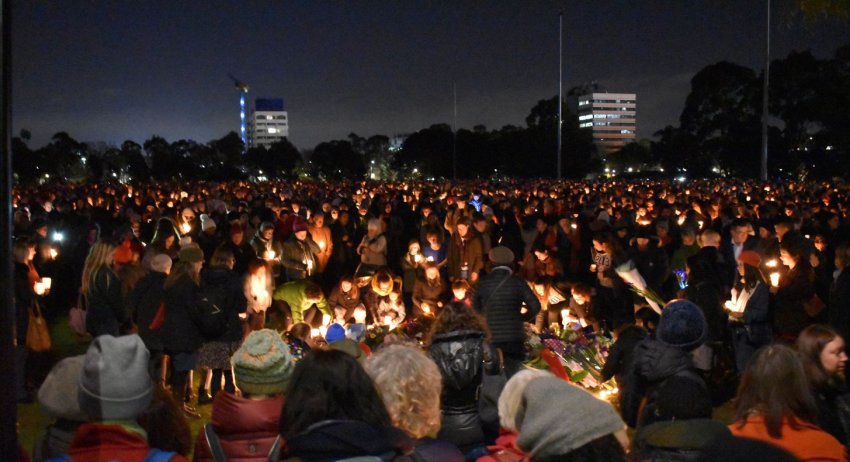
The size — and composition — of the national vigils for comedian Eurydice Dixon on June 18 has given us some hope that with a growing awareness about violence against women we can achieve at least some of the measures we so desperately need.
Not since the community response to Jill Meagher’s murder in 2012 have so many people taken to the streets to demand that women have the right to live free of fear.
The moving testimonies that have been reported from the vigils, including from mothers and fathers about why they took their children along, indicate a real shift in social consciousness.
Yet, if you only read the establishment media you would be forgiven for thinking that nothing has changed. The politician’s response was predictable: men need to change their behaviour and that takes place in the home.
They remain committed to deflecting the nationwide discussion about the nature and causes of violence against women — now at endemic proportions — to one about how to raise our sons and influence our grandsons.
Politicians still want to convince us the solution is a private one and, if there is to be an institutional response, it is to help boost the power of the coercive state by legislating more law-and-order measures.
They are not talking about reinstituting funding for crisis hotlines and women’s refuges. They are not talking about providing emergency accommodation for those needing to flee their homes. They are not talking about more public housing. They are not talking about 24-hour frequent public transport which would help women get to and from where they need to be at all hours of the day and night. They are not talking about an increase in the single parent pension and other pensions and benefits. They are not talking about enforcing equal pay and equal opportunity laws, brought in on the back of the second wave of the women’s movement.
The politician’s language, cloaked in “respect” for women, is their attempt to deflect a growing discussion about measures that would work, which involve the state shelling out on social programs in which women, who do the lion’s share of the work at home, would benefit.
Of course we need a “culture of respect”. But that is only going to happen as we tackle institutional discrimination. Even to focus on preventing violence, the first important step, we need to widen the discussion about why there is so much violence against women.
Margarita Windisch, a sexual assault councillor and educator, on a 3CR panel on June 19 said that to find adequate solutions, we first need to understand this.
She pointed out that “sexual assault and violence are not, in themselves, innate behaviours: they operate in a particular social context”. She said that as part of the spectrum of violence against women, they are a “symptom of the unequal economic system that makes women second-class citizens”.
She added: “But they are also the necessary enforcers of this gender oppression. There is no better way to keep women in their ‘place’ but by using violence against them.”
The federal government’s White Ribbon campaign, launched in 2003, has been an abject failure at preventing domestic violence. It is supposed to be the federal government’s domestic violence primary prevention campaign: it says it was set up to “change the attitudes and behaviours that lead to violence against women”.
White Ribbon’s focus on fundraising (strange, given it receives ample government support and does not contribute to frontline services) and signing up to take an “oath” (which you cannot see until you log your details with the website) smacks of shallowness.
For those in crisis, it recommends ringing the 1800 RESPECT hotline — which the federal government subcontracted to Medibank Health Solutions last year, away from the specialist Rape and Domestic Violence Services Australia (RDVSA). Calls are triaged by non-specialist workers — a mockery of what a crisis line is supposed to be for.
According to Our Watch, a website dedicated to eradicating violence against women and their children, found that one woman is killed every week by a current or former partner and one in three Australian women over the age of 15 has experienced physical violence.
As the #MeToo movement has highlighted, one in five Australian women has experienced sexual violence and one in four women have experienced physical or sexual violence by an intimate partner.
These are staggering and sobering statistics, especially as we know that so many incidents go unreported.
The outpouring of anger and sadness at Eurydice Dixon’s rape and murder reinforces that women have allies in the struggle for real, social solutions. Men and people of fluid genders are showing they are willing to fight. The challenge now for us all is to harness that into a movement that wins back some real social gains.
As Fairfax columnist Jenna Price said: “Put pressure on governments. Put pressure on each other. That is the only thing which will save the lives of women and girls.”
If we accept that gender inequality is the core of the problem, then we should also accept that reversing it has to be at the centre of any solutions.
Women’s subordinate status will only change when we have the ability and means to make the key economic and social decisions affecting our lives.
The very fact that both Malcolm Turnbull and Bill Shorten had to show their faces at the Canberra vigil for Eurydice Dixon shows that they are under pressure. Together, we need to keep the pressure up for real solutions, on our terms, which will begin to shatter institutional sexism.
[Sue Bolton is the Socialist Alliance councillor on Moreland City Council. Pip Hinman is a member of Socialist Alliance in Sydney.]